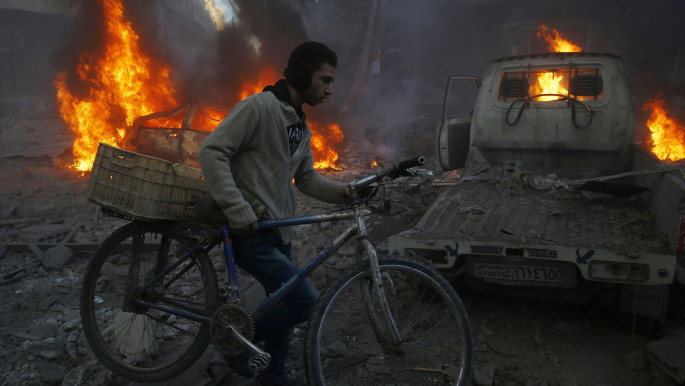Syrian rebels demand anti-aircraft missiles as airstrikes kill schoolchildren
A group of civilians, mostly schoolchildren, were killed on Monday morning as missiles rained down upon the village of Ain Jara in Aleppo province.
"A Russian plane fired guided missiles at a residential neighbourhood in Ain Jara, killing 15 civilians including eight children," activist Alaa al-Halabi told The New Arab.
The Syrian Observatory for Human Rights confirmed the air raid, saying it also injured at least 20 people, all of them children or teachers.
Russian and Syrian regime air raids continued in other areas of northern and southern Syria, as fierce fighting resumed in the vicinity of the mainly rebel-held town of Sheikh Maskin for the second week running.
Russian warplanes carried out at least six strikes in the town on Monday, according to local activists.
In Aleppo city, the opposition-leaning SOHR also reported that three children were killed by rebel rocket fire on a government-held district.
Control of the city has been divided between government forces in the west and rebel fighters in the east since shortly after fighting began there in mid-2012.
Separately, the UK-based Syrian Observatory for Human Rights said the death toll from Russian aerial strikes on a rebel-held town in north-western Syria on Saturday climbed to 81 people, with at least 52 civilians among the dead.
The dead included 23 fighters from the Nusra Front and six other Islamist fighters, reported the Observatory's latest casualty update.
The airstrikes hit a courthouse and prison run by Nusra, al-Qaeda's Syrian franchise, and residential areas in the town of Maarat al-Numan, a major urban centre in Idlib province. Towns in the area have been the target of intense Russian bombing in the past two months.
Moscow's jets were also believed responsible for pounding Talbiseh and Rastan towns in Homs province, and the southern town of Sheikh Miskeen, as part of the Kremlin's military intervention to help the Syrian army gain ground lost to rebels, the Observatory and activists said.
The monitor group said in late December that Russian air strikes had killed more than 2,300 people since they began on September 30, among them 792 civilians.
Moscow has slammed as "absurd" allegations that its strikes had killed civilians.
Anti-aircraft missiles?
Meanwhile, a major Syrian rebel group has said the best way to push Damascus to a political settlement of the country's civil war was to give insurgents anti-aircraft missiles - and has pledged to control the weaponry if provided.
The Army of Islam, echoing opposition concerns over a UN-led drive to launch peace talks in Geneva on January 25, also said it was unacceptable to talk about a political solution to the war while people died of hunger under deadly artillery fire.
The opposition to President Bashar al-Assad wants goodwill measures - including a cease-fire, a detainee release and the end of blockades on besieged areas - before starting negotiations.
UN envoy Staffan de Mistura is shuttling around the region to prepare for the talks, part of a plan endorsed by the UN Security Council last month to end the five-year war.
The Army of Islam, part of a newly formed council to oversee the negotiations on the opposition side, said the "best way to force the regime to accept the [political] solution and stick by it" was to allow states that back the opposition to supply rebels with anti-aircraft missiles.
The statement, sent by the group's spokesman overnight, said it would guarantee the missiles would not reach groups that would use them "illegally".
 |
It is very important that all components of the Syrian opposition have equal rights |  |
Powers including the United States and Saudi Arabia have provided rebels with military support, but have resisted demands for missiles for fear they would end up with hard-line outfits such as the Islamic State group.
The Syrian government told De Mistura on Saturday that it was ready to take part in Geneva talks, but stressed the need to see the names of the Syrian opposition figures who would be taking part.
Pointing to another potential complication, Foreign Minister Walid al-Moallem also stressed the need for the government to obtain a list of groups that would be classified as terrorists as part of the peace process.
Opposition officials have already cast doubt on whether the talks will go ahead on schedule, citing the need to see the goodwill measures from the government side.
In other developments, the recently formed secular Kurdish-Arab alliance demanded that the United Nations give it a seat at the table in upcoming talks in Geneva.
"For us, it is very important that all components of the Syrian opposition have equal rights to participate in the future negotiations," said Haytham Mannaa, the co-head of the Syrian Democratic Council.
"We are ready to participate in any negotiation under the umbrella of Staffan de Mistura," he told AFP, as the organisation wrapped up a two-day meeting in Geneva.
With agencies.






 Follow the Middle East's top stories in English at The New Arab on Google News
Follow the Middle East's top stories in English at The New Arab on Google News


